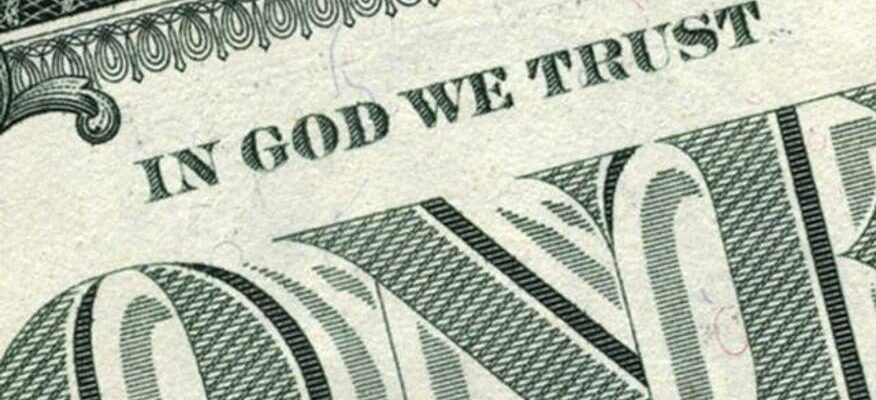We are nearing the end of physical currency; I don’t know many places that do not accept debit cards currently. Many individuals don’t even use debit cards, smartphones are the go-to payment method. We are on the verge of crypto currency becoming the primary vehicle for purchasing goods and services. As soon as the government can figure out a way to regulate it, I am sure we will continue to use it. Something that has always been under heated discussion is the term “In God We Trust,” particularly as it relates to our currency. As we enter the twilight of physical currency, I find myself siding with the removal of “In God We Trust.” Before you accuse me of being a godless atheist in the comments, hear me out.
“In God We Trust” is a bold statement, and a strong one at that. Per my interpretation, the phrase means we have fought the good fight, but we trust in God’s judgement. Additionally, it means that we know we are not in charge, we have placed the reins in God’s hands, and we are satisfied with His results. This is my reasonable understanding of “In God We Trust.”
This statement has been a bit controversial between the two major American political parties. The Left will claim that because of “separation of church and state,” the phrase must be totally expunged from the public. The Right will claim that we are Christain country, and the statement should remain on our currency. Furthermore, the Right will bring up the faith of the Founders as additional evidence to support their claim. This is, obviously, a very watered-down version, but essentially these are the main points from each side.
The statement “In God We Trust” has been on our currency my entire life, so I usually sided with the Right on this argument. The more I learn, the more I realize that this is the incorrect position. Outside of other issues (discussed further in this article), this is the Yankee motto. “In God We Trust” was added to coinage during the War of Northern Aggression, most likely due to the fact that the Confederacy’s motto was Deo Vindice.
Paper currency carrying the motto is a much newer concept, as early as the 1950s to be exact. To the dismay of many of the older Republican or conservative types, this would debunk the argument that this is a representation of the Founding Fathers. Yes, you can still argue the spirit of the idea, but it was not something that was considered during the Founding. So, why was “In God We Trust” added to the currency we use today?
In the 1950s, there was strong anti-communist movement within Heritage America. An element of this anti-communist campaign was the presumption that religion, generally speaking, conveyed that an individual or entity was not communistic. Since the Bolsheviks targeted religion, particularly Orthodox Christianity, during and after the Revolution, this argument had some validity to it. In fact, state atheism was enforced within the Soviet Union. Therefore, including “God” on United States currency was a marker of anti-communism (however superficially). Charles Bennet (a well-respected Dixiecrat from Florida) stated specifically on the House floor that the term was to distinguish the United States from the atheistic Soviet Union. It is also believed that a Presbyterian pastor had the ear of President Eisenhower and was able to convince him that this was a necessary step – that he needed to show the world that the United States was Christian and with Christian ideals. Of course, this is all well and good, I support the idea of a government founded in favor of God’s message. However, the United States discussed here is now long gone. Additionally, and even admiring Heritage America’s efforts with anti-communism, the motto “In God We Trust” was used for very specific anti-Soviet political purposes, not genuinely with trusting in our Lord.
While many individuals make the argument that “In God We Trust” is an exclusionary phrase and does not allow for the worship of non-Christian religions to be recognized, I instead make a different argument. “In God We Trust” should not be used on currency for the simple fact that it is blasphemous to the Lord. Per the King James Bible: “For the love of money is the root of all evil: which while some coveted after, they have erred from the faith, and pierced themselves through with many sorrows.” (1 Timothy 6:10). So, why would we tie the symbol of evil with God?
Finally, the main reason that the phrase should be removed from American currency is simply due to the state of the nation. The LGBTQ+ movement is a blatant slap in the face to God. A country that allows for women to engage in infanticide is not one blessed by God, or trusts in Him. The mainstream popular culture of the United States is explicitly anti-Christian, mocks God and Christ, and wages a culture war on the remnant of Heritage America that still exists. This is not a nation, in any remotely possible way, that has trust in God.
No, I don’t think anything affiliated with this government should have God attached to it. Even on a depreciating U.S. dollar.

Teach a man to fight, he can win a battle.
Teach a man to write, he can win a nation.






All very valid points; many I had not considered. It is obvious that the god in which the current regime and the uniparty are trusting is not the same as was originally intended. The use of God’s name on our national currency is an insult to Him rather than an affirmation.
The Fugio cent, 1787, designed by Ben Franklin carried the motto “Mind Your Business.” If only we had.